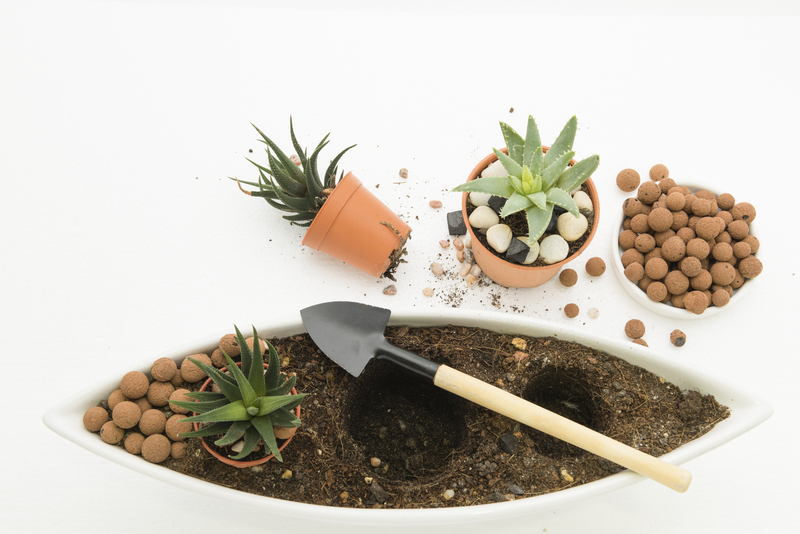9 Crucial Gardening Tips to Inspire the Budding Botanist in You
Posted on 09/09/2025
9 Crucial Gardening Tips to Inspire the Budding Botanist in You
Whether you're an aspiring green thumb or simply looking to bring more life to your backyard, gardening can be a rewarding journey. As more people discover the *joy of nurturing plants*, the desire to learn insider secrets grows. In this comprehensive guide, we'll explore nine crucial gardening tips that will kickstart your journey as a budding botanist and ensure your plants thrive throughout the seasons. Discover essential advice for beginner gardeners while elevating your skills to the next level!

Why Gardening Is Good For You
- Mental Well-being: Spending time in the garden can reduce stress and boost your mood.
- Physical Health: Regular gardening activities provide light exercise and promote mobility.
- Sustainable Living: Growing your own food lowers your carbon footprint and puts fresh produce at your fingertips.
Before we get into our essential gardening tips, it's important to understand that the best gardening practices are rooted in consistency, observation, and patience. Let's dig in!
1. Understand Your Local Climate and Soil
Garden Success Starts from the Ground Up
If you want a flourishing garden, start by getting to know your local growing conditions. The climate and soil type in your area will determine which plants will thrive. Here's what you need to do:
- Test Your Soil: Purchase a simple soil test kit from a gardening store to measure pH and nutrient levels. Most plants prefer slightly acidic to neutral soil (pH 6.0-7.0).
- Observe Sun Exposure: Track how much sunlight each part of your garden receives throughout the day. Is it full sun, partial shade, or full shade?
- Consult Local Resources: Ask your local cooperative extension or garden center about region-appropriate plant varieties.
Expert Tip: Start your garden with native plants--they're better adapted to your microclimate and require less maintenance.
2. Choose the Right Plants for Beginners
Start Simple and Build Confidence
The sheer variety of plants can be overwhelming for new gardeners. To keep things manageable, choose low-maintenance, fast-growing species. Here are some top choices:
- Herbs: Basil, mint, and chives are simple to grow on windowsills or in beds.
- Leafy Greens: Lettuce, spinach, and kale mature quickly and offer a high yield.
- Flowers: Marigolds and sunflowers are hardy, attractive, and pollinator-friendly.
Remember: Select plants that match the sunlight and soil in your chosen spot for best results.
3. Master the Fundamentals of Watering
Avoid Overwatering and Underwatering
Watering is one of the most crucial gardening tips for new gardeners. The *right technique* can make all the difference.
- Water Deeply, Not Frequently: Encourage strong root growth by soaking the soil so moisture penetrates several inches below the surface.
- Best Time to Water: Early morning or late afternoon is ideal--watering during peak sun can cause rapid evaporation.
- Check Moisture Regularly: Insert your finger into the soil up to the second knuckle. If it feels dry, it's time to water.
- Avoid Wetting Foliage: Aim at the base of the plant to reduce the risk of fungal diseases.
Pro Tip: Invest in a soaker hose or drip irrigation system for efficient watering and conservation.
4. Embrace Composting for a Healthier Garden
Turn Kitchen Scraps Into Plant Gold
Composting is an eco-friendly way to recycle organic waste and enrich your soil. It's one of the most rewarding gardening tips to adopt, providing plants with essential nutrients and supporting beneficial soil microorganisms.
- Balance Greens and Browns: Mix nitrogen-rich materials (like fruit peels) with carbon-rich ones (like dry leaves).
- Turn and Moisturize: Aerate your compost pile every few weeks and keep it moist, like a wrung-out sponge.
- Patience Pays Off: Composting can take a few months but will produce nutrient-rich humus that powers plant growth.
Pro Gardening Insight: Use finished compost as mulch or mix it into planting beds for a natural soil boost.
5. Feed Your Plants: Fertilizing Essentials
Nutrition for Thriving Botanicals
Even rich soil can become depleted over time. Regularly feeding your plants keeps them healthy and productive. Here's how to fertilize effectively:
- Follow Plant Needs: Research the nutritional needs of what you're growing (leafy greens vs. fruiting plants, for example).
- Organic vs. Synthetic: Organic fertilizers (like compost, fish emulsion, or worm castings) release nutrients slowly, whereas synthetic fertilizers act faster but can cause buildup if overused.
- Avoid Overfertilization: Too much fertilizer can burn roots and harm beneficial organisms.
Special Note: Feeder roots are usually in the top 6 inches of soil. Water after fertilizing to help nutrients reach the root zone.
6. Practice Strategic Plant Spacing
Give Your Plants Room to Breathe
One common mistake among beginner gardeners is planting too closely together. Proper spacing improves airflow, reduces disease risk, and ensures each plant can reach its full potential.
- Read Plant Labels: Most seed packets and plant tags provide recommended spacing. Follow these guidelines for best results.
- Consider Mature Size: Think about how much space each mature plant will need--not just what fits now.
- Row Orientation: Align rows north to south for maximum sun exposure, especially in vegetable gardens.
Gardening Wisdom: Overcrowding leads to weak, stunted, or diseased plants. Give them the elbow room they deserve!
7. Stay Vigilant Against Pests and Diseases
Nip Garden Problems in the Bud
If you want a flourishing garden, staying proactive about pests and diseases is essential. Consider these gardening tips to keep threats in check--organically:
- Inspect Regularly: Check leaves and stems for holes, discoloration, or unusual spots.
- Encourage Beneficial Insects: Plant native wildflowers and leave some garden debris to attract ladybugs and lacewings that naturally control pests.
- Natural Solutions: Use neem oil sprays, insecticidal soaps, or hand-pick larger pests.
- Rotate Crops: If growing vegetables, rotate crops annually to prevent disease buildup in the soil.
Best Practice: Remove diseased or infested plants immediately to prevent the issue from spreading.
8. Mulch for Moisture and Weed Control
The Secret to a Low-Maintenance Garden
Mulching is one of the most overlooked yet crucial gardening practices. Not only does it suppress weeds, but it also conserves moisture, improves soil structure, and adds a tidy look to your garden beds.
- Choose Organic Mulch: Straw, wood chips, and shredded leaves not only block weeds but also break down to enrich your soil.
- Apply 2-3 Inches Deep: Spread mulch evenly, keeping it away from direct contact with plant stems to avoid rot.
- Refresh Annually: Reapply mulch every season or as it decomposes.
Gardening Fact: Mulched areas can require up to 50% less water than bare soil--saving both time and resources.
9. Keep Learning and Experimenting
The Spirit of a Budding Botanist
Perhaps the most important gardening tip of all is to stay curious and keep experimenting. Every garden (and gardener) is unique, so don't be afraid to try new things and learn from your experiences.
- Join Gardening Groups: Whether online or in your community, connecting with other gardeners is a great way to swap knowledge and ideas.
- Keep a Garden Journal: Record planting dates, successes, challenges, and weather patterns to improve year after year.
- Attend Workshops: Many botanical gardens and nurseries offer classes for gardeners of all skill levels.
- Celebrate Small Wins: Each sprout, bud, and harvest is a step forward in your journey as a botanist!
Inspire Others: Share your garden's progress and newfound wisdom with friends and family--you just might awaken another budding botanist!

Bonus: Gardening Tools Every Beginner Botanist Needs
Equipping yourself with the right set of tools can streamline your gardening experience. Here's a handy list:
- Hand Trowel - For digging and transplanting small plants.
- Pruning Shears - Keep your plants in shape and remove dead growth.
- Watering Can or Hose - Essential for consistent moisture delivery.
- Gloves - Protect your hands from thorns, weeds, and soil-borne pathogens.
- Garden Fork - Ideal for turning soil and mixing in amendments.
Tip: Keep your tools clean and sharp for best results and to prevent the spread of disease.
Conclusion: Let Your Inner Botanist Bloom
Gardening doesn't require a degree in botany--just a willingness to observe, experiment, and nurture. By putting these crucial gardening tips into action, you'll not only cultivate a healthier garden but also unlock the joys of the natural world. Embrace every success and setback, and you'll soon be known as the aspiring botanist with the most vibrant garden on the block.
Ready to transform your backyard--or even your windowsill--into a thriving sanctuary? Keep these essential gardening tips handy, and let your green journey begin. Happy gardening!
Latest Posts
Curating an Interactive Outdoor Haven for Kids
Essential Garden Safety Tips for Dog Owners
Evergreen Climbers for Shade: Envisioning Verdant Sanctuaries
9 Crucial Gardening Tips to Inspire the Budding Botanist in You

